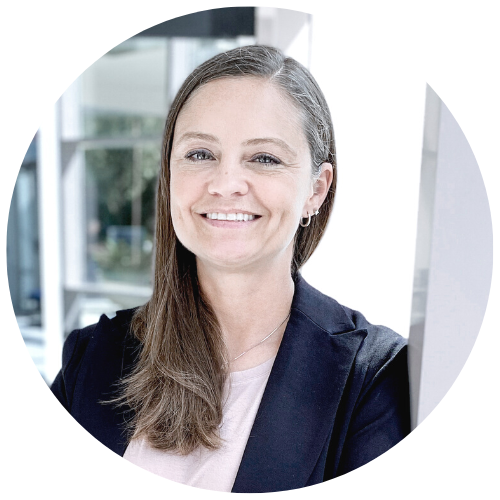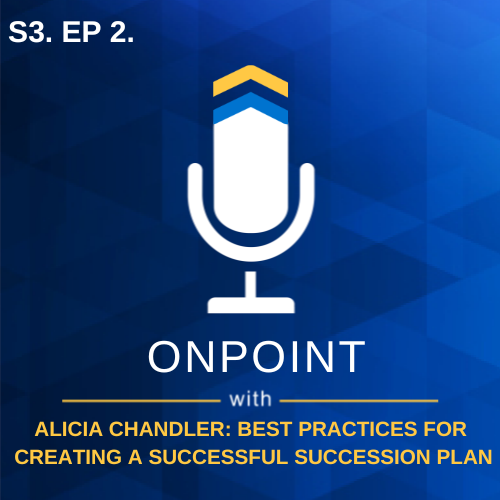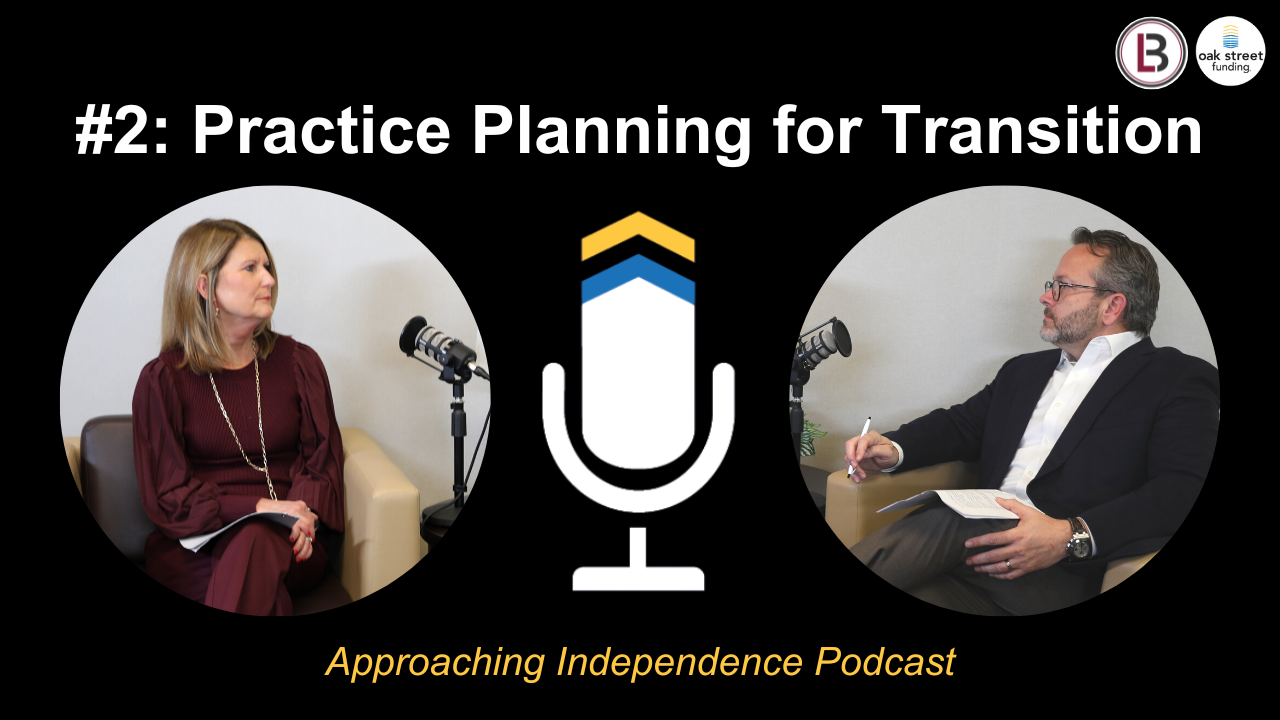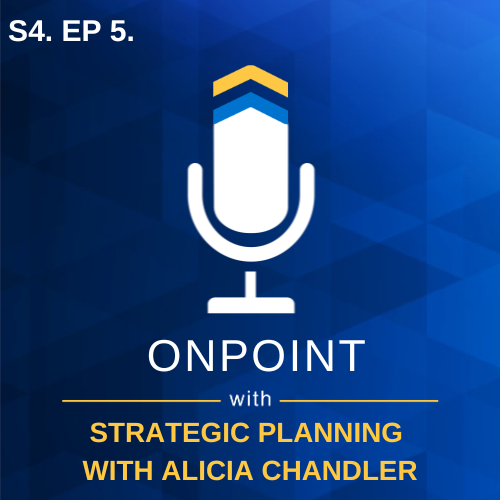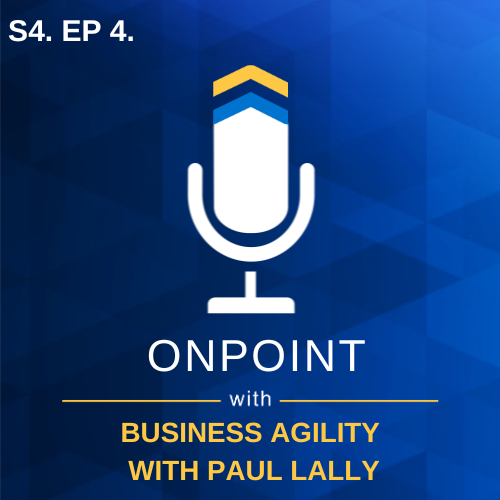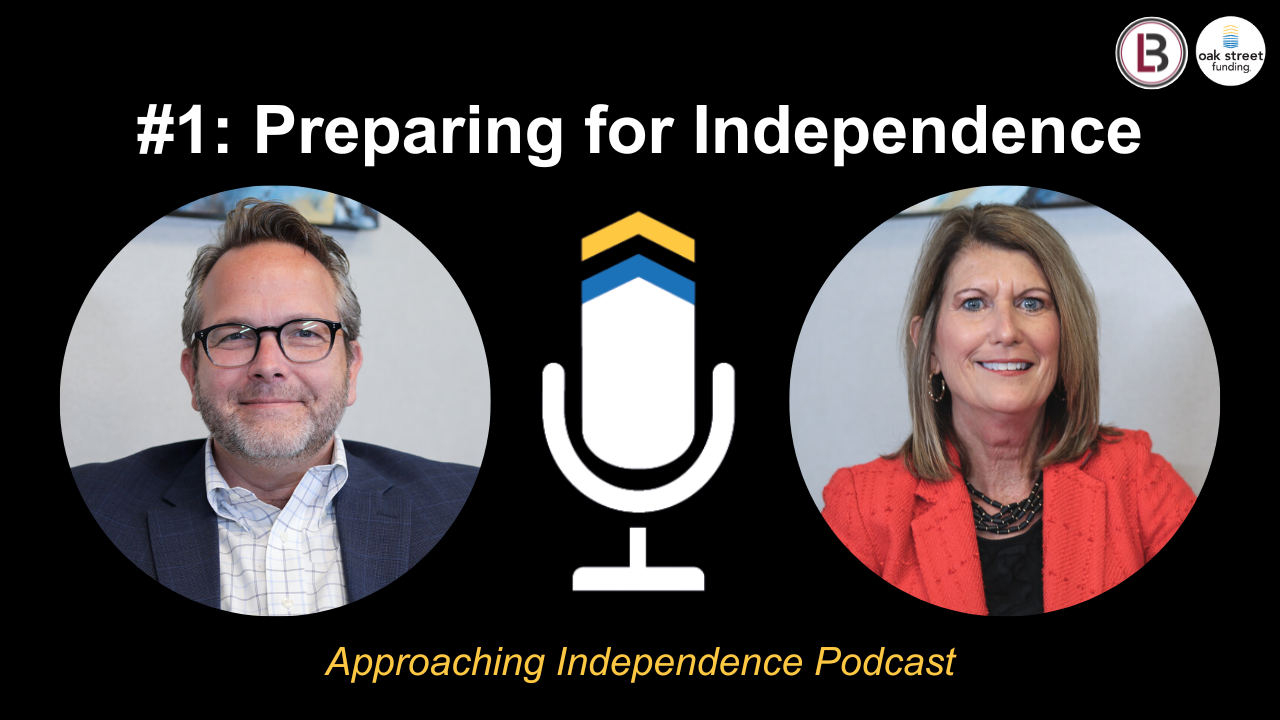S3. Ep. 2 - Best Practices for Creating a Successful Succession Plan with Alicia Chandler
- 0.5
- 1
- 1.25
- 1.5
- 1.75
- 2
Bridget Haight: Hi, and welcome to OnPoint, a podcast by Oak Street Funding, where we bring research and data- backed insights to dig into the minds of industry leaders to learn how to stand out, navigate and break through this ever- changing industry. I'm your host Bridget Haight, and you can support this podcast by following us on Spotify, Apple Podcast, on our website, or wherever you get your podcasts. We'll be there hanging out, talking to industry leaders, and ready to empower you to grow your business. Now, let's get on point. Today, I am delighted to welcome Alicia Chandler to the show. Alicia is the newly appointed President of Oak Street Funding. She has a law degree from the University of Cincinnati and previously served as legal counsel for Oak Street. Over the years, she's helped fund and structure hundreds of loans for succession. Today, she's going to share tips and help business owners prepare for the future. Welcome, Alicia.
Alicia Chandler: Thank you. Thanks for having me today.
Bridget Haight: Thanks so much for being here. I'll just jump right in. To start off, I have a question about succession. What does succession mean in the context of what we're talking about today and how can a business owner plan for it?
Alicia Chandler: I think succession is about maximizing your exit plan for the individual that's, say, the founder of a company. I think the plan is to plan early and often. It's not a one time occurrence. It's a several- year process in my opinion.
Bridget Haight: What does succession plan contain?
Alicia Chandler: That's a good question. It's essentially a roadmap for a planned exit for the founder. I'll say founder, I'm assuming it's the first generation of the business. And so, I'll refer to that person as a founder or G1 throughout the conversation. The founder, they want to maximize their exit, but they also want to make sure that the people coming in can afford to take over the business over time.
Bridget Haight: Some of our audience might be thinking, I am nowhere near retirement. Why should I even be thinking about succession? What would you say to that?
Alicia Chandler: I think that's good. You need to think about succession years in advance of retirement. You don't want to be ready to retire next year and just starting to think about succession.
Bridget Haight: Makes sense.
Alicia Chandler: Because I think the recommended time is probably about five years, because what that does is that gives you, as the leader of a company, assuming it's just one, time to look at the current staff you have, the current leadership you have in place internally or externally. What if you go to John or Susie and you say," I would like you to be my next leader to take over for me"? And John and Susie say," No." Then, what do you do? If you do that at the last second, you're in a tight spot there. You need to have those conversations with those folks early and make sure everybody's on the same page. Do you envision the same structure while you're exiting, planned stages with clients, employees.
Bridget Haight: Right, because clients need to know these things too.
Alicia Chandler: Clients definitely need to know, because they're going to be nervous if they don't know the people that are coming in. And so, you want to take that time to make the introductions and get everyone comfortable that yes, G2, John and Susie, they know what they're doing. I trust them with my business. I trust them with the employees and I want them to take over.
Bridget Haight: Thanks. What are some best practices for structuring a succession deal?
Alicia Chandler: I think one of the most important things is just as we kind of touched on is just making sure you're on the same page with gen two. Is it a five- year plan, a four- year plan, a two- year plan? How involved does the founder want to be? What is that good mix? And so, the only way they're going to do that is to have that conversation and then make sure that it's documented. Even though people may think I've worked with so and so for a long time, or it's my family member, it's fine. We don't need to worry about all the documentation. You do. It just avoids any potential uncertainties, any potential quabbles that might come up.
Bridget Haight: It's almost like a will.
Alicia Chandler: Right, exactly. Someone passes away without a will, all of a sudden, family members fight. They're not your best friend. They're not your closest cousin or brother or sisters. You got to make sure that that's set up. You also need to make sure that what is the structure of the deal going to be? Does the founder want a large lump sum of cash? Do they want to step it out over a few years? There may be some tax consequences that everyone needs to take into consideration with the basis and everything. Is it going to be an earnout? Is it going to be a seller note? Is it going to be just a fifth, say it's five years, a fifth each year for the next five years? There's a variety of structure points. They also need to take into effect what if the market changes? What if the value of the company drops during the time that there's a transition? They need to build in some of those terms and conditions on if we have a purchase price reduction or if a certain client leaves, how are they going to adjust that compensation going forward?
Bridget Haight: Just out of curiosity, what is your favorite part about dealing with successions?
Alicia Chandler: Actually, it's overall what I like about the business in general, but for successions, it's just seeing that founder have the confidence in that next generation and getting rewarded for all the work they've done. They've worked very, very hard to get where they are. They've probably sacrificed a lot personally along the way, and it's nice to see them have that vision of look, I can retire in a couple years and I can realize the value of everything I've put into this company over the last 20, 30 years, sometimes even longer, and be able to see that, hey, I can retire and I can actually enjoy the fruits of my labor and I'm comfortable leaving it with gen two and they're going to take care of my employees and my clients. That's really cool.
Bridget Haight: That's great. It always comes back down to just personal matters and how much that matters. That's great. We've talked about the importance of succession planning for the current business owner. How should the incoming owner or partner plan for succession?
Alicia Chandler: I think the first thing is to actually, if you're wanting to be the second generation, you need to have the conversation with the owner or the founder.
Bridget Haight: Makes sense.
Alicia Chandler: Because one, maybe they're not thinking of that succession plan. Maybe they've not thought about retiring and they haven't really thought about who is going to be that next person. I think it just is incumbent upon the people that want to come in to have that honest conversation and determine if that is the path that they want to go down. What if perhaps the owner says," You are not my successor"? Then that person needs to reassess and think," Do I want to stay here maybe?" Maybe they want to leave. It's just important to have that conversation early on so that everyone's rowing in the same direction and just understanding how that will transition, what role will you take on, is there any education that you need, any other training.
Bridget Haight: In the five years that you're a company, what can you do?
Alicia Chandler: Right, a couple years, I mean, three years, five years. Do you have the right client connections? Do you need to go on client visits with the owner? Do you need to have those relationships established? Then I think the most important thing is once that groundwork is laid is to understand how you're going to pay for it. I don't know many people that have just a pile of money sitting in the back waiting. You're going to have to assess how that purchase price is going to be structured, and then how are you going to pay for it. You're going to have to look for a specialty lender like Oak Street that understands the value of the future revenue stream and how that's going to play out.
Bridget Haight: When it comes to succession planning, I'm sure not everything always goes smoothly. Could you give us an example of a succession that's going really well and then maybe one that's not going so well, and how does Oak street funding assist with both of those?
Alicia Chandler: Sure. Let's start with the positives. We have a number of succession planning clients right now. I actually received a call last week from a gentleman that is going through his second year, or we'll call it a second tranche, of buying out the prior owner. He called and said," Look, we're waiting on our valuation." They structured their agreement very well. They're doing it each year. They're getting a valuation to reassess the value of that second piece of stock buyout. He reached out and said," What do I need to get set up for a year- end time?" That's great, because this is, we're in August. I told him that was wonderful, that he was reaching out so far in advance, and everything was going well. The clients are transitioning. The valuation, he expects it to be greater, so that's wonderful for him. It's great for the founder because she's going to get a little bit more money, but everything's going as they planned.
Bridget Haight: Good.
Alicia Chandler: We're very happy to give him that additional cash flow. Unfortunately, from time to time, you may see some that don't work out. You may have a scenario where four people are coming in buying out one owner, and maybe out of the four, maybe one of them, maybe for whatever reason it's not working out amongst the four, maybe the client transition isn't going as well, maybe there's just some personal issues, you just never know. And so, it's always incumbent upon those parties to have a provision in their buyout that talks about the what ifs. What if we're in year one or two, and this doesn't work out with one or more owners? How do you buy back that stock? Maybe the other three or four that are there, maybe they want to buy out that individual that's not working out, or maybe even the founder would want to step back in and repurchase those shares and look for a different successor. We can work with that. We just need to understand where everybody is and understand what's the path forward. Does this involve additional loan proceeds? Does this involve paying back some of the transition proceeds that were already paid out? Communication is always key. We always encourage our people, our borrowers to reach out to us and just have that conversation early and often if they see something that's not going in the right direction.
Bridget Haight: That's a great answer. Thank you, Alicia.
Alicia Chandler: Thank you.
Bridget Haight: Before we close today, I do have one more final question.
Alicia Chandler: Sure.
Bridget Haight: At the close of a show, we like to ask the fun questions. I would like to know, when you were 10 years old, what was your dream job?
Alicia Chandler: When I was younger, I like to do a lot of, just kind of play a lot of different things, but one of the things I did do was play banker with my brother. My mom used to be a teller at a bank and we had some mugs and I would sit at a desk and hand out money.
Bridget Haight: That's fantastic.
Alicia Chandler: I know that's obviously not as easy as that, but I probably played too much monopoly as a child and like to be the banker, so that was something I did a lot.
Bridget Haight: Nice. That's a great answer. Well, thank you again for joining us. We really appreciate hearing everything that you have to say.
Alicia Chandler: Thank you. Appreciate it.
Bridget Haight: Thank you all for listening to OnPoint, a podcast by Oak Street Funding, where we bring research and data- backed insights to dig into the minds of industry leaders, to learn how to stand out and navigate and break through this ever- changing industry. I'm Bridget Haight and tune in next time wherever you listen to podcasts as we get on point. Don't forget to subscribe and leave us a review. Thanks for listening. To get in contact with someone at Oak Street Funding, please call 844-353-8022. That's 844-353-8022 to learn more.
DESCRIPTION
Today I am delighted to welcome Alicia Chandler to the show! Alicia is the newly appointed president of Oak Street Funding. She has a law degree from the University of Cincinnati and previously served as legal counsel for Oak Street. Over the years, she has helped fund and structure hundreds of loans for succession. Today, she is going to share tips to help business owners prepare for the future. Welcome, Alicia!
Today's Host
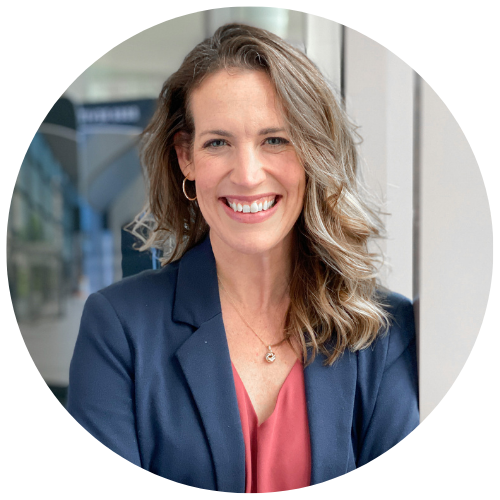
Bridget Haight
Today's Guests
